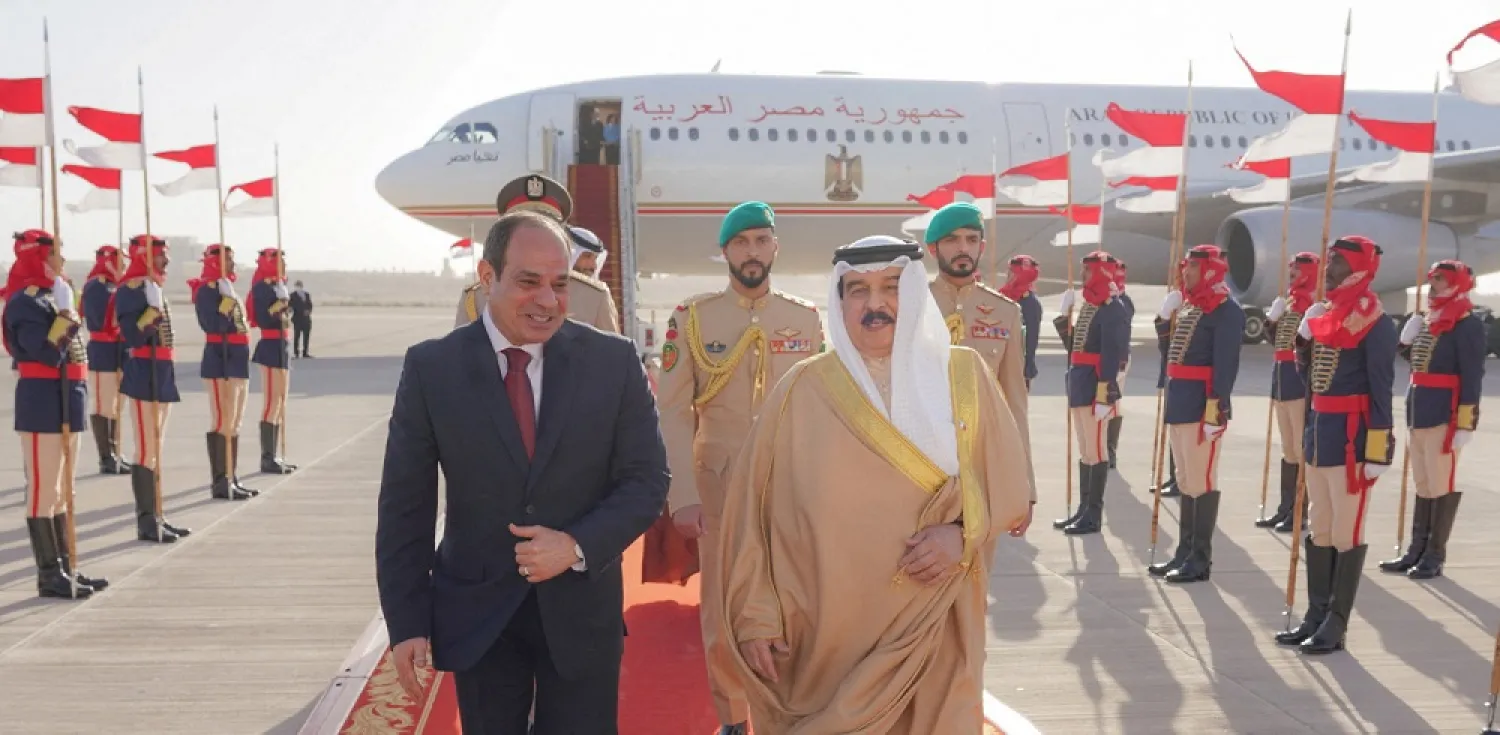Egyptian Abdel Fattah al-Sisi kicked off on Tuesday a two-day visit to Bahrain, flying in from Oman, as part of a Gulf tour.
King Hamad bin Isa Al Khalifa received Sisi at al-Sakhir Palace in Manama. The two leaders held official talks in the presence of Crown Prince Salman bin Hamad.
The King praised Egypt's pivotal role as the pillar of security and stability in the region, highlighting its commendable efforts in championing Arab causes and boosting joint Arab action against various challenges.
Sisi stressed the importance of the relations, asserting: "We are always keen on holding such meetings to enhance cooperation between our two brotherly countries across various fields."
The Bahrain News Agency (BNA) said the two sides reviewed the solid fraternal Bahraini-Egyptian relations and ways to further the strategic cooperation between them for the benefit of the two brotherly peoples.
King Hamad said Sisi's visit reflects the outstanding bilateral relations and embodies the keenness of the two countries' leaderships on constant communication, coordination, and consultation on various regional issues of mutual interest to serve their interests and address the problems of the Arab Nation.
The Egyptian presidency spokesman announced that the two leaders discussed regional and international issues of mutual concern that require concerted efforts to protect Arab national security and confront attempts to destabilize and interfere in their domestic affairs.
Ahead of his arrival in Bahrain, Sisi concluded a two-day official visit to Oman, during which six memoranda of understanding, two agreements, three executive programs, and letters of cooperation were signed.
Sisi met with Sultan Haitham bin Tariq in the Omani capital, Muscat.
Egyptian Foreign Minister Sameh Shoukry met his Omani counterpart Badr bin Hamad al-Busaidi, affirming the importance of resolving disputes through peaceful means and dialogue.
They stressed the depth of relations between their countries and underscored the need to develop them in various fields of cooperation, especially the economic, investment, tourism, and scientific levels.
During the meeting, they exchanged views on regional and international issues of common interest.
A joint statement issued after the Egyptian President visited Oman affirmed the two countries' strong desire to strengthen bilateral relations and advance them towards broader horizons.
The Egyptian spokesman said Sultan Haitham valued Egypt's prominent role in enhancing the mechanisms of joint Arab action in the face of the current crises and challenges in the region.
He noted that the role of Egypt is a model to be emulated in preserving stability and improving the economic and social conditions in the Arab world.
The meeting discussed ways to foster closer cooperation, notably in trade and economic relations and joint investments, particularly in light of the outcomes of the Joint Business Council and the Egyptian-Omani Joint Committee held in Muscat in January 2022.
The two sides exchanged views on several international issues, particularly the Russian-Ukrainian crisis and its repercussions on the region.
They exchanged visions regarding the upcoming summit between the Gulf states, Egypt, Jordan, Iraq, and the United States, to be held in Saudi Arabia.
They discussed the developments in Arab and regional issues, especially the Yemeni crisis.
They agreed on the importance of bolstering coordination between the two countries to support the unity and sovereignty of the Yemeni state and the safety of its national institutions, leading to a sustainable political settlement that ends the Yemeni people's suffering and meets their needs and aspirations.
They stressed that the security and stability of Yemen are of utmost importance to the safety of the Arab and the Red Sea regions.









